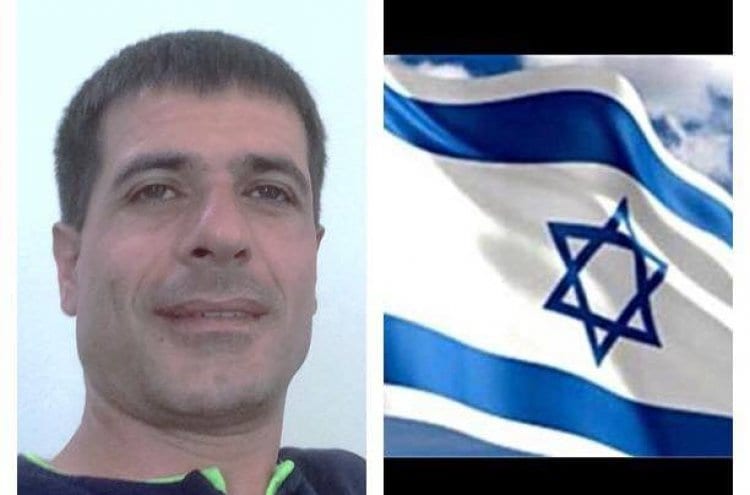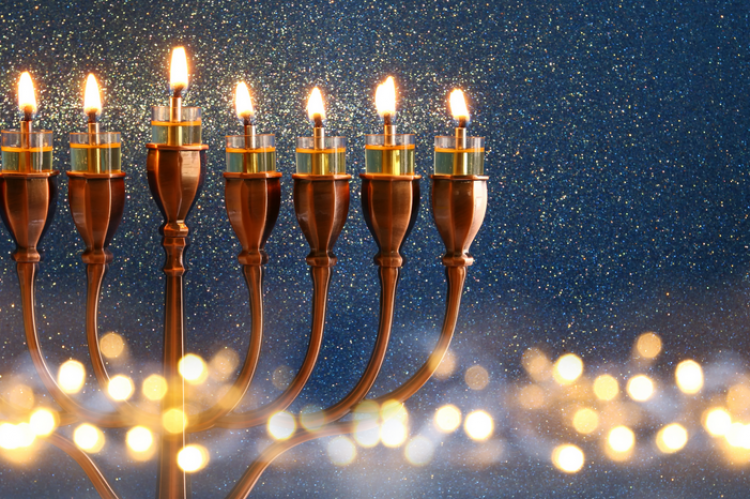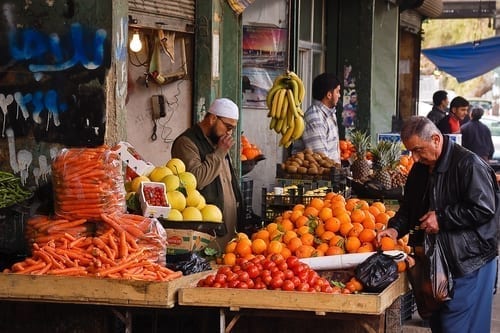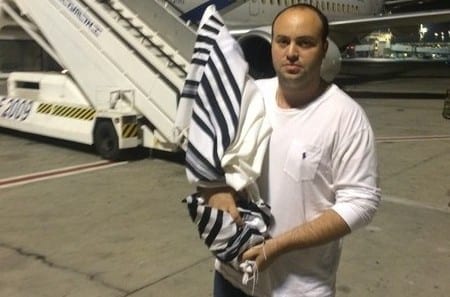I'm outside the Bedouin camp. I sling my guitar across my aching, throbbing chest. I close my eyes. I can still feel the relentless sun, the smell of parched shrubbery and sheep, the sound of a radio broadcast in the distance. But I don’t have to see the canvas shacks and tin huts scattered beneath the crag. I don’t have to look at my daughter’s home. For the moment I can look beyond it, to the hope.
“Chana’le,” I call. “Come home.”
My daughter Chana’le was a typical Bais Yaakov girl, the third in a warm family of six children. I’m the rav in a Sefardi shul here in Be’er Sheva, and my wife and I have put all of our hearts and souls into creating a home of peace, love and purity.
If you had told me that one day I’d be grandfather to Mohammed (my daughter says she named him Menachem after the Lubavitcher Rebbe), I’d have asked you why you were cursing me. I still can’t believe this nightmare.
My daughter Chana’le lives with Ali, a Bedouin Arab, and their five children, in a Bedouin village. It is a mere 15 minutes from my home, yet in another world.
Every day, every minute, I pine for her return. When I wake up in the morning, Chana’le is on my mind. When I go to sleep at night, my last thought is Chana’le. I have not given up hope that one day she will return. And I never will.
I rack my brain, trying to think of how this could have happened. Was it the suffering through a shameful episode in school, where her principal reprimanded her in public, that made Chana’le recognition-hungry? How had she become so vulnerable to the attention of Ali, a young Arab working at a local construction site in Be’er Sheva?
Ali managed to convince her to meet with him in the makolet, where he came to buy his daily loaf of pita and hummus. He would give her what she craved.
“A daughter of the rav shouldn’t have to take the city bus,” he told her. “Come, I’ll take you where you’re going.” He asked her when she needed to leave. She said in an hour. He said he would wait for her. He asked for her phone number and said they’d be in touch; and when she finished, she gave him her number. Now that he had her number the relationship really started.
By the time I found out about it, he had been pursuing her for two months. Were they already secretly married? Frantic, I immediately arranged a seat for her on the next flight out of the country to Ukraine. I hoped that space and time would give her the levelheadedness to rethink this poisonous relationship. And then once she realized her mistake she could continue to rehabilitate. But first I had to take her out of immediate danger.
What I didn’t know was that Chana’le was already expecting a baby. Eight months later, at the age of 16, my daughter gave birth to a son. She named him Yehuda Yisrael—Yehuda after me, as per our Sefardic mesorah, and Yisrael because he is part of am Yisrael.
Chana’le stayed with our friends in Ukraine for two years. When she turned 18, we figured it was already safe for her to come back home. We planned for her to stay in a kibbutz far from our home. Ali would have no way of ever finding her there, and the entire episode would be behind us. Our fate was otherwise.
On the way home from the airport, traveling toward the kibbutz, we stopped at a gas station. The cashier, an Arab woman, recognized Chana’le, and told her husband, who told his cousin that she was back with their child. Ali found her. In retrospect, I wonder if Chana’le set it up so she could find him, or whether she’d been in touch with him all the time.
Chana’le went back to him. And once again we were shattered.
In the intervening eight years, Chana’le has borne five children. She lives in a Bedouin village and raises her children as Arabs.
In the beginning, the shock and despair was so bewildering, so paralyzing, I didn’t want to talk to her. But then I realized it wouldn’t help me, and it wouldn’t bring her back. My pain and loss would be constant, whether or not we would speak. My only hope, I came to realize, was that keeping our relationship alive would one day create the avenue for her homecoming.
My wife is beyond consolation. It was as if half her heart was amputated. Her relationship with Chana’le is stilted and shaky. I don’t encourage contact between the two because my wife can’t cope with the situation. Each time she is with her she suffers for days. To take my wife out of her darkness I sing for her with my guitar. The same guitar I take to play for Chana’le outside the Bedouin village. Songs of hope. Songs of prayer.
My children, too, initially wanted nothing to do with Chana’le. They felt that she had left the fold and there was nothing they could say to her. Some of them have since come around and followed my example to woo her back with love.
Today Chana’le visits with me every week, and I walk near her village to sing my heart out to Hashem on a weekly basis. I don’t know if she knows, if she listens, but I know I’m there for her.
Every time I see her, her face seems to tell me something else. At first, I could see on her face, “Don’t worry, Abba. It’s just temporary. I’ll come back.” After her third son was born, her face said, “I don’t know what to do. Now I have to take care of my children.” After her fifth child was born, she said to me “How can I come back? I have five kids. He won’t let me back without a hard fight. Who would take me back in Be’er Sheva? Who would give me a job? I don’t know what to do.” Her eyes tell me, “Don’t abandon me. I know you’re my father. I know you think of me every second.”
What I tell her with my eyes, with my presence in her life, with all of my being is, “We would solve all of your problems. Just come home.”
In the meantime, I’m there for my grandchildren. They are called by their Arab names, but each boy was given a Jewish name at his brit milah. After each son was born, I worked hard and fought valiantly for my grandchildren to have a brit shel Avraham Avinu. The Arabs perform a surgical circumcision, but I begged my daughter to give them a brit. In my community, for my flock, I’m the mohel, the shochet, the mesader kiddushin. To Ali, my services are irrelevant. I had to beg and bribe him to make a brit.
My grandchildren like to visit me. I sit with them and talk and play. Flesh of my flesh, I know they have Arab blood coursing through their veins. But they have Jewish souls. They belong to us.
My eldest grandchild, Yehuda, started his schooling in an Arab madrasa. I very much wanted him to get a Jewish education. I taught him Shema Yisrael and always instilled in him that he’s a Jew. He went back to his village and told everyone that he’s a Jew and said Shema Yisrael. He was hit by his teacher and the other children. His father started making him do extreme spiritual things to get him to repent to Islam. For his own good I don’t teach him anything about Judaism any longer, because he can’t live like a Jew in his village. I toned down my teachings to the grandchildren.
This isn’t the pain of a child veering off the straight path, going off the derech, or getting lost and disillusioned. This is a child, my precious daughter, living with an Arab. She has five children with him. Her life is in the Bedouin village. This is the greatest pain. I remind myself that Yaakov Avinu also lost a daughter to an Arab village. I’ve calculated the biblical map and I know that the place where she lives is where the original Be’er Sheva was. I believe that there are holy nitzotzot that were there and need to be picked up by Jews returning to Judaism.
Unfortunately, she has a certain security with Ali. He’s a handyman in Be’er Sheva, and he is her provider. I tell her that I’ll provide for her, that we’ll find her a job, a house, everything. Maybe she feels that these are empty promises, that she can’t trust that I’ll have the means to give her what Ali gives her. But I feel in my heart that she hasn’t ruled out coming home.
She never left Judaism. It wasn’t to escape Yiddishkeit that she left. Until this day she keeps the fundamentals of Judaism. She tries, even though it’s not always possible. She doesn’t eat chametz on Pesach, and I bring her matzos. She fasts on Yom Kippur. Shabbos and kashrus are too hard to keep but she does what she can. She put a mezuzah on the door, which Ali threw out. Her looks could even pass for chareidi. She doesn’t wear the burka, but she covers her hair with a tichel.
She’s able to live somewhat like a Jew, because the Arabs in her village consider it an honor for them to have “captured” the daughter of a rav. A low-class, ignorant Jew is not half as interesting to them as a Bais Yaakov girl from an influential Jewish family. In the beginning they tried pressuring her to convert to Islam, but they saw she wouldn’t, so they left her alone. Instead, they boast to her that their religion is a lot like ours, that they also perform ritual slaughter and certain mitzvos.
She’s very respected, and sometimes I wonder if that keeps her there. If Ali were a bit more abusive, if the villagers would be hostile—would that give her reason to leave their midst?
All I can do is continue to shower her with love, so that she knows she has a place to come to when she’s ready to leave.
Due to my experience, I’ve become somewhat of an address for other families going through the same heartbreak. Good families come to me, telling me that their daughters have suddenly run off with an Arab. My heart breaks for them. It’s a tragedy that happens quite frequently, rachmana litzlan. It’s the silent holocaust—no need for suicide bombers, no need to kill. Just seduce our girls with affection.
Families of these victims turn to me, because they know we’ve kept the doors of communication open with Chana’le and they want to know how. How did we do it? They are heartbroken, they feel guilty. What did they do wrong? Their family is falling apart; they blame each other as if it was their fault, as if they didn’t do enough, as if they could have prevented this.
I tell them that these situations don’t occur because of problems in the family. My other children are all very successful and I’ve raised them well. This is a nisayon min hashamayim, like any other nisayon. Their daughter, a victim, still deserves their love. Our love will bring these daughters home.
To date, I’ve helped 12 familes whose daughters returned to the Jewish nation. We set these women up with everything they needed. The Israeli government isn’t supportive of these women, but we, the families, have to be if we don’t want them to be lost forever. I helped one woman and gave her an entire apartment. She returned to Ramallah after a month. She left in the middle of the night, her kids clad in pajamas, because even though I did whatever I could, she felt her livelihood was better when she was with the Arabs. It was a very bitter pill to swallow.
It’s a delicate and difficult procedure to get a woman out of an Arab village, and when she finally does leave she needs all of our support in order to acclimate back into Jewish society. There’s fear that the Arab man might come after her. Arabs don’t hesitate to kill their women. These women in Arab villages are trapped and have great difficulty getting out.
My daughter visits freely at my house, because she knows she’s always welcome. Two days ago, I married off a daughter, and Chana’le participated at the wedding. I emailed her pictures of the wedding. I keep her part of the family.
Every day I speak to Hashem. I thank Him and believe that today will be the day that this nightmare will end and my daughter will be freed. But if today isn’t the day, it’s okay. Maybe tomorrow. I need to see every day as a new and wondrous day when everything can change. Even if today isn’t better, there is always hope. There’s a reason I’m going through this and when the tafkid of this trial will be complete, Chana’le will come home. I always tell our Father in Heaven, “Abba, I love You. My body and neshamah are Yours. It’s all Yours and You do as You know is good.”
When she’ll come back I want a year of no work, just me and my guitar singing to Hashem and thanking Him. I don’t want anything else in the world, just to cry to Him and rest. I’m so exhausted.
I’m a simple Jew. My parents came from Alexandria, Egypt. They were hardworking people who kept the mitzvos in the land of Israel. I learned in Tifrach, under Rav Chaim Feldman, and when I became the rav, I was excited by each person who joined our shul, who made it to the minyan on Shabbos, who helped us grow to 150 families strong. Never did I imagine that my daughter would be lost to our nation. Never did I believe that my heart could be so broken.
I go out once a week, and I drive to the outskirts of my daughter’s village. The Arabs don’t bother me there. I stay in the barren fields, and take out my guitar. I start strumming and singing, singing and crying. Song is like a prayer. It returns my koach to me; it gives me the strength to carry on. I stand there for an hour, calling out her name, Chana’le, and calling out to Hashem. May my call be answered soon. Amen.
0 60 10 minutes read





